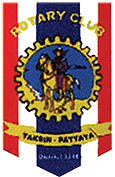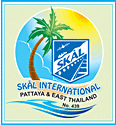- HEADLINES [click on headline to view story]:
-
Pet Paradise featured at Central Festival Pattaya Beach
-
Sikh women donate 21,300 baht for YWCA scholarships
-
Thai law is just to Thai and foreigner alike
-
Thailand prepares to host 8th ASEAN Skills Competition
|
|
Pet Paradise featured at
Central Festival Pattaya Beach
Sawittree Namwiwatsuk
For four days, Pattaya’s largest shopping mall became a “pet
paradise” with gold skunks, prairie dogs and mischievous rabbits taking
center stage.
 The
“romantic performance show” between pets and their wet nurses, performed by
Prem Busarakamwong and Ploi Chidchan. The
“romantic performance show” between pets and their wet nurses, performed by
Prem Busarakamwong and Ploi Chidchan.
The Oct. 22-25 fair aimed at boosting tourism and giving children on school
break a furry diversion, Pet Paradise 2009 featured a floor of domestic and
exotic animals, shows and exhibits.
The first-floor plaza featured gold skunks, prairie dogs, marmosets, bushy
tail possums, albino bamboo rats and a family of mischievous rabbits to
create lots of amusement for the spectators.
There was also a “romantic performance show” between pets and their wet
nurses, performed by Prem Busarakamwong and Ploi Chidchan that included
animal shows and comedy by “Four Legs Bad Day.”
Sikh women donate 21,300 baht for YWCA scholarships

Women of the Thai Sikh Association
contribute
money to the to the YWCA Happy Family project.
Vimolrat Singnikorn
More than 20,000 baht donated by women from the Thai Sikh Association
will be used to fund 12 new scholarships for underprivileged children.
YWCA Bangkok-Pattaya Center Chairwoman Nittaya Patimasongkroh accepted the
donation Oct. 18 on behalf of the group’s Happy Family project. Started in 1990,
the project, dedicated to making merit in honor of HRH Princess Sirindhorn,
provides funds and other aid to children who cannot afford a proper education.
The Thai Sikh women collected 21,300 baht in all, which will be used to fund 12
scholarships of 1,775 baht each. The money will be given to children before the
start of the school term in November.
Thai law is just to Thai and foreigner alike
Emcee Judith Edmonds welcomed everyone to the regular Sunday
meeting of the Pattaya City Expats Club on October 25 at the Amari’s Henry J.
Bean Restaurant, then called on Gary Hacker to introduce our guest speaker, who
really needed no introduction. Drew Noyes is not only a well known business man
in Pattaya, but is also a fellow club member and a past chairman of the club.
Drew is the president of the recently formed Optimist Club and is the managing
director for Pattaya Times Media Group and P.A.P.P.A. Legal and Visa Service
Company.
 After
inviting visitors to introduce themselves, MC Judith Edmonds introduces the
speaker of the day, former PCEC chairman Drew Noyes. Drew is owner of PAPPA Co. After
inviting visitors to introduce themselves, MC Judith Edmonds introduces the
speaker of the day, former PCEC chairman Drew Noyes. Drew is owner of PAPPA Co.
Drew started by handing out an outline of his topic. He also briefly described
the staff and services provided by his P.A.P.P.A. Legal and Visa Services
Company, Ltd. Drew divided his topic into three main areas: (1) overview of Thai
law; (2) how to take ownership or complete control of property without using a
Thai company; and (3) last wills and testaments.
He advised the audience that Thai law is based on written documents. Because of
this, if you find yourself in a Thai court, it is the written documents that
prevail; not any verbal promises or assurances. So, he cautioned everyone, if it
is important and of value to get it in writing.
Drew pointed out that Thai law is just to Thai and foreigner alike. Once a case
gets into the court system, the judge’s decision will be based on Thai law and
the evidence.
Drew described the various risks and expenses involved with using a Thai company
to acquire property - especially if one uses Thai nominees. One can take the
risk, but Drew pointed out there was another way to structure a property
transaction that provides the foreigner with enough control to protect their
investment. Further, this method complies fully with Thai law.
 Drew
gave a most interesting talk on living and doing business in Thailand, including
land ownership, and preparations for ‘the end’ - making a will in Thailand. The
audience was packed, and many questions were asked. Drew
gave a most interesting talk on living and doing business in Thailand, including
land ownership, and preparations for ‘the end’ - making a will in Thailand. The
audience was packed, and many questions were asked.
He explained that in Thailand, the Chanote (title deed) on file at the Land
Office is the controlling document for land ownership. The front side identifies
the property and its location. The reverse shows the owners of the property in
succession. Normally, the last name on the Chanote is the owner of record.
However, if the owner borrows money against the land, a mortgage can be recorded
at the Land Office and the mortgage holder will then appear as the last entry.
In Thailand, a foreigner can legally lend money to a Thai to acquire property
and can be the holder (owner) of the mortgage. As the lender, the foreigner can
also keep physical possession of the Chanote; a practice that the banks use when
they lend money for property. Further, the property cannot be sold without the
mortgage holder’s approval - usually upon receipt of all money due.
However, there are more documents required. A mortgage just shows that a certain
amount is owed the mortgage holder; it does not describe the terms of the loan.
Consequently, a loan agreement must also be executed setting forth the interest
rate and terms of repayment.
Drew described how the loan agreement should be structured to protect the
foreigner. He then noted that the foreigner usually acquires the property as a
place to live. To ensure that the foreigner has the right to live in the
property, another document is needed. This is a long term lease. The lease is
also filed at the Land Office.
Drew described several provisions that should be in the lease to cover
contingencies such as subletting, death of the land owner, sale of the property
by the land owner, and inheritance in the event of the foreigner’s death. He
said that under Thai law the maximum term for a lease is 30 years; but the lease
can have terms to extend it another 20 years. He cautioned that to be legal, the
extension cannot set a price for the extension period. This is something that
would need to be negotiated at the termination of the original lease term; but
all other provisions in the lease remain the same.
Another document that needs to be prepared to complete the process is a
promissory note. If done correctly, the lease income to the Thai is offset by
the interest due on the loan and mortgage, thus eliminating or reducing the
taxes due on the income.
But there is still one more document needed. This is a power of attorney from
the land owner to the foreigner that allows them to sell the property to satisfy
the mortgage if the loan terms are not adhered to. With this document, the
property can be sold and ownership transferred at the Land Office without the
mortgagee land owner needing to be present.
After answering several questions over the various documents and their
structuring, Drew then concluded by discussing last wills and testaments. A will
does not have to be in Thai. He also mentioned that in Thailand, there is no
probate. Unless someone challenges a will, property and asset transfer occurs
fairly quickly. If the will should get involved in a Thai court, it will have to
first be translated into Thai.
Drew suggested that a Thai version be made simultaneously with the English or
other language version. Drew said for a will to be valid in Thailand it has to
show where it was written, the date it was written, and have two witnesses.
Also, the will needs to show the name, address, and age at time the will is
drawn, of the beneficiaries. It should list assets and show how they are to be
divided among the beneficiaries.
Drew also said it is a good idea to include secondary beneficiaries in case of
the premature death of an original beneficiary.
Although there is no requirement for an executor, Drew pointed out several
advantages of naming one. He also said that you should include instructions
regarding your burial or cremation so that it can be shown to your embassy
making them aware of your wishes and to whom the police should release the
remains.
Emcee Judith updated everyone on upcoming events and called on Richard
Silverberg to conduct the always informative, interesting, and sometime humorous
Open Forum where questions are asked and answered about living in Thailand and
Pattaya in particular.
Thailand prepares to host
8th ASEAN Skills Competition
Meeting delegates experience Loy Krathong

Representatives and VIPs from the
ten-member ASEAN countries led by Labor Permanent Secretary Somchai Choomrat
(7th right) conclude preparatory meetings held at Dusit Thani Pattaya for the
upcoming 8th ASEAN Skills Competition.
Dusit Thani Pattaya has welcomed delegates to the 1st
Organizing Committee in preparation for the 8th ASEAN Skills Competition to be
held at the Exhibition Centre at Muang Thong Thani Bangkok from November 18-25,
2010.
Labor Permanent Secretary Somchai Choomrat presided over the opening ceremonies
on November 3 at the Napalai Convention Hall at Dusit Thani Pattaya. The event
was attended by observer delegates and representatives of the ten ASEAN member
countries such as Brunei Darussalam, Cambodia, Indonesia, Laos, Malaysia,
Myanmar, the Philippines, Singapore, Vietnam and Thailand.
In his speech, Choomrat expressed Thailand’s readiness to host the competition
which is held every two years with the objective of developing regional skills
and making them at par with international standards. The skills consist of
twenty fields such as Welding Technology, Information Technology, Web Design,
Electronics, Fashion Technology, Food and Beverage Services, Design and Drawing,
Computer Graphics and others.
The first night of the event coincided with Thailand’s celebration of one of its
most famous and best-preserved traditions, Loy Krathong, the Festival of Lights.
After the welcome dinner, the delegates were ushered to the hotel’s Lagoon Pool,
the venue where they set their krathong adrift after making a wish or two. The
gesture is believed to cast away ones’ misery and ill fortunes as the krathong
floats away.
Meanwhile, young couples also believe that Loy Krathong is the time to make a
wish together for a long and lasting happiness in love and romance.
|
|

News | Business | Features |
Columns | Mail Bag |
Sports | Auto Mania
Our Children | Travel |
Our Community | Dining Out & Entertainment
Social Scene | Classifieds |
Community Happenings | Books Music Movies
Clubs in Pattaya | Sports Round-Up
E-mail: [email protected]
Pattaya Mail Publishing Co.Ltd.
62/284-286 Thepprasit Road, (Between Soi 6 & 8) Moo 12, Pattaya City
T. Nongprue, A. Banglamung,
Chonburi 20150 Thailand
Tel.66-38 411 240-1, 413 240-1, Fax:66-38 427 596
Copyright © 2004 Pattaya Mail. All rights reserved.
This material may not be published, broadcast, rewritten, or redistributed.

|
|

Rotary
International

www.rotary-jomtien.org

www.rotary-taksin.org

|